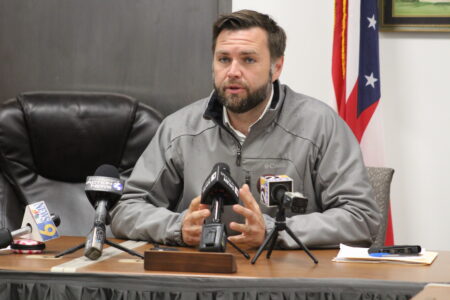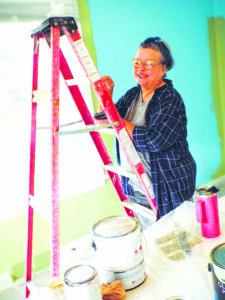Wonner explains OML view on tax initiatives
LISBON — As the debate over property tax continues to wage on in Ohio, the topic took center stage at the Ohio Municipal League (OML) Conference that took place Oct. 8-14 in Columbus.
The OML is a statewide nonprofit organization in Ohio that represents the collective interests of cities and villages before the state government. It is governed by a Board of Trustees on which Lisbon Fiscal Officer Tracey Wonner serves.
Wonner attended the conference and told Lisbon leaders last week that property tax reform legislation is being considered by the Ohio General Assembly.
“As of Sept. 16 between the [Ohio] House and the Senate, there are 22 different bills within those two houses,” Wonner said. “Eighteen within the House and four in the Senate with ideas and ways to try to reform property taxes. They are trying to get ahead of this.”
What Ohio legislators are trying to get ahead of is a grassroots effort led by groups like Citizens for Property Tax Reform for an Ohio constitutional amendment to ban all taxes on real property, including land, buildings and improvements.
Property tax discussions reached a fevered pitch in June when proposals to eliminate or reform property tax through House Bill 335, also known as the Property Tax Relief NOW Act, was introduced. The bill ultimately did not pass in its original form and was a subject of much debate before the legislative session ended. The bill proposed to eliminate “inside millage,” which is a portion of property taxes collected by local governments without a vote, with the intent of providing $3.5 billion in property tax relief but offered no replacement for the funding that would have been stripped from municipalities and school districts who rely heavily on property tax revenue.
The calls for property tax reform continue and groups like Citizens for Property Tax Reform and AxOhTax.com, who argue that property taxes mean an individual never really owns their house as long as property taxes exist and equate rising property taxes as a form of rent, are currently collecting signatures across the state to allow Ohio voters to decide the issue.
To qualify for the ballot, the groups must collect a significant number of valid signatures, just shy of a million, but the proposed amendment would not only eliminate property taxes but also potentially lead to service cuts or increased other taxes, such as sales or income taxes, to compensate for the lost revenue for the municipalities in the OML.
“To get that initiative on the ballot, you need a little over 800,000 signatures, but a caveat with that 800,000 is that 418,000 of those 800,000 has to come from 44 different counties,” Wonner explained. “It can’t come from only where the Big C’s [Cincinnati, Columbus and Cleveland] are. You have to have it from 44 different counties.”
Wonner said the “main talk on the floor” is that really “almost double” the 800,000 signatures are needed. The House, Senate and OML liaisons “are not sure” the signatures will be obtained but recognize the movement has “momentum.”
Several local municipalities and school boards have spoken out against any legislation or an amendment that would abolish property tax altogether without alternative funding solutions in place.
For school districts, such reform would mean staff and programs reductions and force districts to put levies on the ballot. For villages and cities, it would mean cuts to police and fire departments and more levies. For example, House Bill 335 would have cost West Branch Schools $2 million annually and the Village of East Palestine would have lost a minimum of $200,000 from its general fund.
But proponents of a constitutional amendment in Ohio eliminating property tax say that stark reality is that people, and often the elderly, lose their homes due to the inability to pay sky-rocketing property taxes. According to relator.com, Ohio now ranks eighth in the nation for property tax burden, ahead of even New York and California, yet it sits 40th in median household income. It reports that the tax delinquency rate is at 18% in Mahoning County and more than $70 million in unpaid property taxes is due with some neighborhoods in Youngstown even seeing rates as high as one in three homeowners behind.
It’s not clear what Columbiana County’s numbers are, but in September alone 25 complaints for delinquent taxes and requests for foreclosures due to the unpaid taxes were filed in the county Common Pleas Court.
Wonner said the other hot topic at the OML Conference was House Bill 503, introduced this month, that would require voter approval to change municipal income tax reciprocity credits and to allow voters to initiate a process for modifying or repealing these credits. That legislation would diminish home rule – the power of Ohio local governments, primarily municipalities, to govern themselves through their own charters and ordinances, provided they do not conflict with state laws.
“This bill means it would be put to the voters and no longer be an in-house thing,” Wonner explained. “The biggest concern when you are sitting at OML and you are listening to this stuff is the home rule. That’s where if you get a chance to talk to [Ohio Senator] Al Cutrona or [State Representative] Monica Robb Blasdel, those are two hot topics you need to ask them what their feelings are when it comes to home rule because that’s what we are.”


